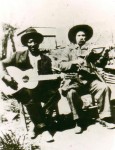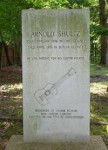 From October 1, 2010 through to the end of September 2011, we will, each day, celebrate the life of Bill Monroe by sharing information about him and those people who are associated with his life and music career. This information will include births and deaths; recording sessions; single, LP and CD release dates; and other interesting tidbits. Richard F. Thompson is responsible for the research and compilation of this information. We invite readers to share any tidbits, photos or memories you would like us to include.
From October 1, 2010 through to the end of September 2011, we will, each day, celebrate the life of Bill Monroe by sharing information about him and those people who are associated with his life and music career. This information will include births and deaths; recording sessions; single, LP and CD release dates; and other interesting tidbits. Richard F. Thompson is responsible for the research and compilation of this information. We invite readers to share any tidbits, photos or memories you would like us to include.
- April 14, 1931 Arnold Shultz died near Morgantown, Butler County, Kentucky, aged 45 years. A diseased heart valve claimed his life. *
- April 14, 1951 Bill Monroe was served with a summons in a lawsuit brought by songwriter Tomie Thompson, who alleged that he had written the lyrics to Kentucky Waltz. Apparently, Monroe claimed that he had bought the lyrics outright. **
- April 14, 1972 Bill Monroe and the Blue Grass Boys appeared at the four-day First Annual International Country Music Fan Fest. ***
 * Arnold Shultz was a blues-guitar-playing mentor and friend of Bill Monroe’s.
* Arnold Shultz was a blues-guitar-playing mentor and friend of Bill Monroe’s.
The multi-talented African-American Shultz – he could play the fiddle, banjo, mandolin and piano, as well as guitar, and was the writer of Cannonball Rag – was a laborer and itinerant musician, playing with both jazz and blues bands. Taught by an uncle, he developed a ‘thumb-style’ way of playing the guitar, although he was as readily able to play finger-style.
Apparently, he gave Bill Monroe his opportunity to play his first paid gig, joining Shultz at square dances with Arnold on fiddle and Monroe on guitar.
As well as being a major influence on Bill Monroe, introducing the blues element that Monroe incorporated into his own playing and providing a key ingredient for bluegrass music, Shultz was an influence on the four legendary Muhlenberg County (Kentucky) finger-pickers Kennedy Jones, Ike Everly, Mose Rager and Merle Travis. That influence later extended to Chet Atkins.
 Legend has it that Shultz either died of ‘bad’ whiskey or poison administered by jealous white musicians, or that he suffered a stroke while boarding a bus.
Legend has it that Shultz either died of ‘bad’ whiskey or poison administered by jealous white musicians, or that he suffered a stroke while boarding a bus.
He is buried in Morgantown’s only black cemetery.
Monroe once said of Shultz…
“There’s things in my music, you know, that come from Arnold Shultz; ½ runs that I use in a lot of my music. I don’t say that I make them the same way that he could make them, ’cause he was powerful with it. In following a fiddle piece or a breakdown, he used a pick and could just run from one chord to another the prettiest you’ve ever heard. There’s no guitar picker today that could do that.”
While Richard D. Smith wrote in his book about Bill Monroe, Can’t You Hear Me Callin’, that had he been recorded by field folk recorders or race record labels…
“Arnold Shultz would today share the pantheon of African-American country blues greats with Mississippi John Hurt, Son House, and even Robert Johnson.”
** On the very same day that Monroe was served with the summons, Eddie Arnold’s recording of Kentucky Waltz hit the Billboard country music charts, eventually spending three weeks at number one.
*** The first Bluegrass Spectacular show took place in a circus-sized tent in the grounds of the soon-to-be-opened Opryland USA theme park, Nashville. Other artists to appear were the Country Gentlemen, Lester Flatt, Jim & Jesse, James Monroe, Reno & Harrell, and Ralph Stanley.







